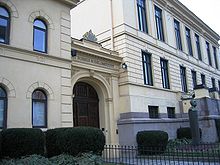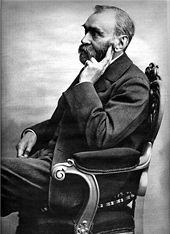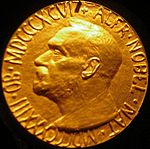- Nobel Peace Prize
-
The Nobel Prize in Peace Awarded for Outstanding contributions in Peace Presented by Norwegian Nobel Committee Country Norway First awarded 1901 Official website Nobelprize.org The Nobel Peace Prize (Norwegian and Swedish: Nobels fredspris) is one of the five Nobel Prizes bequeathed by the Swedish industrialist and inventor Alfred Nobel.
Contents
Background
According to Nobel's will, the Peace Prize shall be awarded to the person who
“ ...shall have done the most or the best work for fraternity between nations, for the abolition or reduction of standing armies and for the holding and promotion of peace congresses.[1] ” Alfred Nobel's will further specified that the prize be awarded by a committee of five people chosen by the Norwegian Parliament.
Nobel died in 1896 and he did not leave an explanation for choosing peace as a prize category. As he was a trained chemical engineer, the categories for chemistry and physics were obvious choices. The reasoning behind the peace prize is less clear. According to the Norwegian Nobel Committee, his friendship with Bertha von Suttner, a peace activist and later winner of the prize, profoundly influenced his decision to include peace as a category.[2] Some Nobel scholars suggest it was Nobel's way to compensate for developing destructive forces. His inventions included dynamite and ballistite, both of which were used violently during his lifetime. Ballistite was used in war [3] and the Irish Republican Brotherhood, an Irish nationalist organization, carried out dynamite attacks in the 1880s.[4] Nobel was also instrumental in turning Bofors from an iron and steel company to an armaments company.
It is unclear why Nobel wished the Peace Prize to be administered in Norway, which was ruled in union with Sweden at the time of Nobel's death. The Norwegian Nobel Committee speculates that Nobel may have considered Norway better suited to awarding the prize, as it did not have the same militaristic traditions as Sweden. It also notes that at the end of the nineteenth century, the Norwegian parliament had become closely involved in the Inter-Parliamentary Union's efforts to resolve conflicts through mediation and arbitration.[2]
Nomination and selection
 The Norwegian Nobel Institute in Oslo, Norway.
The Norwegian Nobel Institute in Oslo, Norway.
The Norwegian Parliament appoints the Norwegian Nobel Committee, which selects the Nobel Peace Prize laureate.
Nomination
Each year, the Norwegian Nobel Committee specifically invites qualified people to submit nominations for the Nobel Peace Prize.[5] The statutes of the Nobel Foundation specify categories of individuals who are eligible to make nominations for the Nobel Peace Prize.[6] These nominators are;
- Members of national assemblies and governments and members of the Inter-Parliamentary Union,
- Members of the Permanent Court of Arbitration and the International Court of Justice at the Hague,
- Members of Institut de Droit International,
- University professors of history, social sciences, philosophy, law and theology, university presidents and directors of peace research and international affairs institutes,
- Former recipients, including board members of organizations that have previously won the prize,
- Present and past members of the Norwegian Nobel Committee, and
- Former permanent advisers to the Norwegian Nobel Institute.
Nominations must usually be submitted to the Committee by the beginning of February in the award year. Nominations by committee members can be submitted up to the date of the first Committee meeting after this deadline.[6]
In 2009, a record 205 nominations were received,[7] but the record was broken again in 2010 with 237 nominations; in 2011, the record was broken once again with 241 nominations.[8] The statutes of the Nobel Foundation do not allow information about nominations, considerations or investigations relating to awarding the prize to be made public for at least 50 years after a prize has been awarded.[9] Over time many individuals have become known as "Nobel Peace Prize Nominees", but this designation has no official standing.[10] Nominations from 1901 to 1956, however, have been released in a database.[11]
Selection
Nominations are considered by the Nobel Committee at a meeting where a short list of candidates for further review is created. This short list is then considered by permanent advisers to the Nobel institute, which consists of the Institute's Director and the Research Director and a small number of Norwegian academics with expertise in subject areas relating to the prize. Advisers usually have some months to complete reports, which are then considered by the Committee to select the laureate. The Committee seeks to achieve a unanimous decision, but this is not always possible. The Nobel Committee typically comes to a conclusion in mid-September, but occasionally the final decision has not been made until the last meeting before the official announcement at the beginning of October.[12]
Awarding the prize
Obverse of the Nobel Peace Prize Medal presented to Sir Ralph Norman Angell in 1933; the Imperial War Museum, London.
The Chairman of the Norwegian Nobel Committee presents the Nobel Peace Prize in the presence of the King of Norway on 10 December each year (the anniversary of Nobel's death). The Peace Prize is the only Nobel Prize not presented in Stockholm. The Nobel laureate receives a diploma, a medal and a document confirming the prize amount.[13] As of 2009, the prize was worth 10 million SEK (about US$1.4 million). The Nobel Peace Prize Ceremony is held at the Oslo City Hall.
Response
Unlike the scientific and literary Nobel Prizes, usually issued in retrospect often two or three decades after the awarded achievement, the Peace Prize has been awarded for more recent or immediate achievements, or with the intention of encouraging future achievements.[citation needed] Some commentators[14] have suggested that to award a peace prize on the basis of unquantifiable contemporary opinion is unjust or possibly erroneous, especially as many of the judges cannot themselves be said to be impartial observers.
In 2011 a feature story in the Norwegian newspaper Aftenposten contended that major criticisms of the award were that "Nobel Committee ought to recruit members with [more of a] professional and international background... that can do just as good a job as retired MPs of Norway"; that "there is too little openness about the criteria that the committee uses when they choose a recipient of the prize"; and that "the adherence to Nobel's will should be more strict".[15]
According to the Norwegian historian Øivind Stenersen, Norway has been able to use the prize as an instrument for nation building and furthering Norway's foreign policy and economic interests.[16]
Criticism of individual conferments
Main article: Nobel Prize controversiesThe awards given to Lê Ðức Thọ and Henry Kissinger, prompted two dissenting Committee members to resign.[17]
The awards given to Yitzhak Rabin, Shimon Peres and Yasser Arafat,[18][19] Lê Ðức Thọ,[20] Henry Kissinger,[20] Rigoberta Menchú,[21] Jimmy Carter,[22] Al Gore[23], and Barack Obama[24][25][26] have all been the subject of controversy and criticism.
Alleged omissions
Foreign Policy magazine has listed Mohandas Gandhi, Eleanor Roosevelt, Václav Havel, Ken Saro-Wiwa, Sari Nusseibeh and Corazon Aquino as people who "never won the prize, but should have".[27] Other notable omissions that have drawn criticism include Pope John Paul II[28] and Dorothy Day.[29] It was widely reported that Irena Sendler had been nominated for the 2007 prize, which was jointly won by the Intergovernmental Panel on Climate Change and Al Gore.[30][31][32]
The omission of Mohandas Gandhi has been particularly widely discussed, including in public statements by various members of the Nobel Committee.[33][34] The Committee has confirmed that Gandhi was nominated in 1937, 1938, 1939, 1947 and, finally, a few days before his death in January 1948.[35] The omission has been publicly regretted by later members of the Nobel Committee.[33] Geir Lundestad, Secretary of Norwegian Nobel Committee in 2006 said, "The greatest omission in our 106 year history is undoubtedly that Mahatma Gandhi never received the Nobel Peace prize. Gandhi could do without the Nobel Peace prize, whether Nobel committee can do without Gandhi is the question".[36] In 1948, following Gandhi's death, the Nobel Committee declined to award a prize on the ground that "there was no suitable living candidate" that year. Later, when the Dalai Lama was awarded the Peace Prize in 1989, the chairman of the committee said that this was "in part a tribute to the memory of Mahatma Gandhi".[37]
List of laureates
Main article: List of Nobel Peace Prize laureatesNotes
- ^ "Excerpt from the Will of Alfred Nobel". Nobel Foundation. http://nobelprize.org/alfred_nobel/will/short_testamente.html. Retrieved 2008-03-31.
- ^ a b "Why Norway?". The Norwegian Nobel Committee. http://nobelpeaceprize.org/en_GB/about_peaceprize/why-norway/. Retrieved 2009-10-11.
- ^ Altman, L. (2006). Alfred Nobel and the prize that almost didn't happen. New York Times. Retrieved 14 October 2006.
- ^ BBC History - 1916 Easter Rising - Profiles - The Irish Republican Brotherhood BBC
- ^ "Nomination for the Nobel Peace Prize". Nobel Foundation. http://nobelprize.org/nomination/peace/index.html. Retrieved 2009-09-10.[dead link]
- ^ a b "Who may submit nominations?". The Norwegian Nobel Committee. http://nobelpeaceprize.org/en_GB/nomination_committee/who-can-nominate/. Retrieved 2009-09-10.
- ^ ""President Barack Obama wins Nobel Peace Prize"". Associated Press on yahoo.com. http://news.yahoo.com/s/ap/eu_nobel_peace. Retrieved 2009-10-09.
- ^ "Nominations for the 2011 Nobel Peace Prize". Nobel Foundation. http://nobelpeaceprize.org/en_GB/nomination_committee/nomination-2011/. Retrieved 2011-10-07.
- ^ "Nominations for the 2009 Nobel Peace Prize". The Norwegian Nobel Committee. http://nobelpeaceprize.org/en_GB/nomination_committee/nomination-2009/. Retrieved 2009-10-11.[dead link]
- ^ Who may submit nominations - Nobels fredspris
- ^ "Nomination Database — The Nobel Peace Prize, 1901-1956". Nobelprize.org. http://www.nobelprize.org/nobel_prizes/peace/nomination/database.html. Retrieved 2011-09-11.
- ^ "How are Laureates selected?". The Norwegian Nobel Committee. http://nobelpeaceprize.org/en_GB/nomination_committee/selection-process/. Retrieved 2009-09-10.
- ^ What the Nobel Laureates Receive. nobelprize.org.
- ^ Murphy, Clare (10 August 2004). "The Nobel: Dynamite or damp squib?". BBC online (BBC News). http://news.bbc.co.uk/2/hi/middle_east/3724734.stm. Retrieved 2009-10-11.
- ^ Aspøy, Arild (2011-10-04). "Fredsprisens gråsoner". Aftenposten: p. 4. "Nobelkomiteen bør ta inn medlemmer med faglig og internasjonal bakgrunn... som gjøre en like god jobb som pensjonerte stortingsrepresentanter."
- ^ Aspøy, Arild (2011-10-04). "Fredsprisens gråsoner". Aftenposten: p. 4. "Aldri tidligere hadde fredsprisen vært et bedre instrument for nasjonsbygging og en mer verdifull støtte for norsk utenrikspolitikk og økonomiske interesser"
- ^ Tønnesson, Øyvind (29 June 2000). "Controversies and Criticisms". Nobelprize.org. http://nobelprize.org/peace/articles/controversies/index.html. Retrieved 27 February 2010.
- ^ Said, Edward (1996). Peace and Its Discontents: Essays on Palestine in the Middle East Peace Process. Vintage. ISBN 0679767258.
- ^ Gotlieb, Michael (24 October 1994). "Arafat tarnishes the Nobel trophy". The San Diego Union — Tribune: p. B7.
- ^ a b "Worldwide criticism of Nobel peace awards". The Times (London). 18 October 1973. http://archive.timesonline.co.uk/tol/viewArticle.arc?articleId=ARCHIVE-The_Times-1973-10-18-06-006&pageId=ARCHIVE-The_Times-1973-10-18-06. Retrieved 2009-10-11.
- ^ I, Rigoberta Menchú, liar, David Horowitz, Salon Right On!, January 11, 1999
- ^ Douglas G. Brinkley. The Unfinished Presidency: Jimmy Carter's Journey to the Nobel Peace Prize (1999)
- ^ "A Nobel Disgrace". National Review Online. September 22, 2009. http://www.cbsnews.com/stories/2007/10/12/opinion/main3361452.shtml. Retrieved 2011-10-2.
- ^ "Surprised, humbled Obama awarded Nobel Peace Prize". Associated Press. http://news.yahoo.com/s/ap/20091009/ap_on_re_eu/eu_nobel_peace. Retrieved 2009-10-09.[dead link]
- ^ Otterman, Sharon (2009-10-09), "World Reaction to a Nobel Surprise", The New York Times, http://thelede.blogs.nytimes.com/2009/10/09/world-reaction-to-a-nobel-surprise/?hp#bozoanchor, retrieved 2009-10-09
- ^ "Obama Peace Prize win has Americans asking why?". reuters.com. 2009-10-09. http://www.reuters.com/article/GCA-BarackObama/idUKTRE5983AM20091009?virtualBrandChannel=11621&sp=true. Retrieved 2009-10-09.
- ^ Kenner, David. (7 October 2009). "Nobel Peace Prize Also-Rans". Foreign Policy. Retrieved 10 October 2009
- ^ "Pope John Paul II deserves the Nobel Peace Prize". The Kingdom. 6 June 2005. http://www.the-kingdom.ie/news/story/?trs=kfidmhidsn. Retrieved 2009-10-10.
- ^ Roberts, Nancy L. (1984). "Dorothy Day and the Catholic Worker". ISBN 9780873959384. http://books.google.com.au/books?id=Wx5A4UE05QYC&source=gbs_navlinks_s.
- ^ Hevesi, Dennis (13 May 2008). "Irena Sendler, Lifeline to Young Jews, Is Dead at 98". The New York Times. http://www.nytimes.com/2008/05/13/world/europe/13sendler.html?ref=world. Retrieved 2010-05-05.
- ^ Woo, Elaine (13 May 2008). "Irena Sendler, 98; saved 2,500 children in the Holocaust". The Boston Globe. http://www.boston.com/bostonglobe/obituaries/articles/2008/05/13/irena_sendler_98_saved_2500_children_in_the_holocaust/. Retrieved 2010-05-05.
- ^ de Quetteville, Harry (15 March 2007). "Poland honours heroine who saved children". Telegraph. http://www.telegraph.co.uk/news/uknews/1545602/Poland-honours-heroine-who-saved-children.html. Retrieved 2010-05-05.
- ^ a b Tønnesson, Øyvind (1 December 1999). "Mahatma Gandhi, the Missing Laureate". The Nobel Foundation. http://nobelprize.org/nobel_prizes/peace/articles/gandhi/index.html. Retrieved 2007-10-17.
- ^ http://nobelprize.org/prize_announcements/peace/ask_questions.html
- ^ "The Nomination Database for the Nobel Peace Prize, 1901-1956: Gandhi". Nobelprize.org. http://nobelprize.org/nomination/peace/nomination.php?key1=candname&log1=LIKE&string1=gandhi&action=advsearch&log10=OR&key2=candname&log2=LIKE&string2=&log11=OR&key3=candname&log3=LIKE&string3=&startyear=&endyear=&order1=year&order2=nomname&order3=cand1name&submit2.x=0&submit2.y=0&submit2=Go. Retrieved 2008-10-13.[dead link]
- ^ [1] Relevance of Gandhian Philosophy in the 21st Century
- ^ Presentation Speech by Egil Aarvik, Chairman of the Norwegian Nobel Committee
See also
External links
- "The Nobel Peace Prize" – Official site of the Nobel Foundation.
- "The Nobel Peace Prize" – Official webpage of the Norwegian Nobel Institute for the Norwegian Nobel Committee.
- "All Nobel Laureates in Peace" – Index webpage on the official site of the Nobel Foundation.
- "The Nobel Prize Award Ceremonies" – Official hyperlinked webpage of the Nobel Foundation.
- "The Nobel Prize Medals and the Medal for the Prize in Economics" – By Birgitta Lemmel; an article on the history of the design of the medals featured on the official site.
- "National Peace Nobel Prize shares 1901-2009 by citizenship (or home of organization) at the time of the award." – From J. Schmidhuber (2010): Evolution of National Nobel Prize Shares in the 20th Century at arXiv:1009.2634v1
- "The Nomination Database for the Nobel Prize in Peace, 1901-1956" – Database featured on the official site of the Nobel Foundation.
- "What the Nobel Laureates Receive" – Featured link in "The Nobel Prize Award Ceremonies".
Nobel Prizes Prizes Laureates by subject- Chemistry
- Literature
- Peace
- Physics
- Physiology or Medicine
by criterion- Country
- University affiliation
- Year
- Female
- Black
- Chinese
- Indian
- Muslim
- Japanese
- Jewish
Organizations Related topics - Controversies
- Other prizes
- Alfred Nobel
Nobel Peace Prize Laureates of the Nobel Peace Prize 1901–1925 - Dunant / Passy (1901)
- Ducommun / Gobat (1902)
- Cremer (1903)
- IDI (1904)
- Suttner (1905)
- Roosevelt (1906)
- Moneta / Renault (1907)
- Arnoldson / Bajer (1908)
- Beernaert / Estournelles de Constant (1909)
- IPB (1910)
- Asser / Fried (1911)
- Root (1912)
- La Fontaine (1913)
- International Committee of the Red Cross (1917)
- Wilson (1919)
- Bourgeois (1920)
- Branting / Lange (1921)
- Nansen (1922)
- Chamberlain / Dawes (1925)
1926–1950 - Briand / Stresemann (1926)
- Buisson / Quidde (1927)
- Kellogg (1929)
- Söderblom (1930)
- Addams / Butler (1931)
- Angell (1933)
- Henderson (1934)
- Ossietzky (1935)
- Saavedra Lamas (1936)
- Cecil (1937)
- Nansen Office (1938)
- International Committee of the Red Cross (1944)
- Hull (1945)
- Balch / Mott (1946)
- QPSW / AFSC (1947)
- Boyd Orr (1949)
- Bunche (1950)
1951–1975 - Jouhaux (1951)
- Schweitzer (1952)
- Marshall (1953)
- UNHCR (1954)
- Pearson (1957)
- Pire (1958)
- Noel‑Baker (1959)
- Lutuli (1960)
- Hammarskjöld (1961)
- Pauling (1962)
- International Committee of the Red Cross / League of Red Cross Societies (1963)
- King (1964)
- UNICEF (1965)
- Cassin (1968)
- ILO (1969)
- Borlaug (1970)
- Brandt (1971)
- Kissinger / Le (1973)
- MacBride / Sato (1974)
- Sakharov (1975)
1976–2000 - Williams / Corrigan (1976)
- AI (1977)
- Sadat / Begin (1978)
- Mother Teresa (1979)
- Esquivel (1980)
- UNHCR (1981)
- Myrdal / García Robles (1982)
- Wałęsa (1983)
- Tutu (1984)
- IPPNW (1985)
- Wiesel (1986)
- Arias (1987)
- UN Peacekeeping Forces (1988)
- Dalai Lama (1989)
- Gorbachev (1990)
- Suu Kyi (1991)
- Menchú (1992)
- Mandela / de Klerk (1993)
- Arafat / Peres / Rabin (1994)
- Pugwash Conferences / Rotblat (1995)
- Belo / Ramos-Horta (1996)
- ICBL / J.Williams (1997)
- Hume / Trimble (1998)
- MSF (1999)
- Kim (2000)
2001–present - Complete list
- (1901–1925)
- (1926–1950)
- (1951–1975)
- (1976–2000)
- (2001–2025)
Coordinates: 59°54′42″N 10°44′01″E / 59.91167°N 10.73361°E
Categories:- Nobel Peace Prize
- 1901 introductions
- Norwegian awards
- 1901 establishments in Norway
Wikimedia Foundation. 2010.



